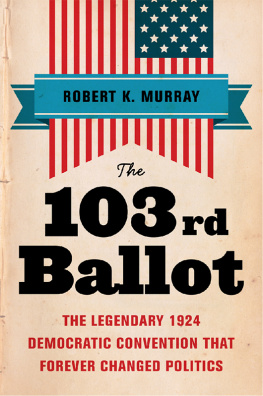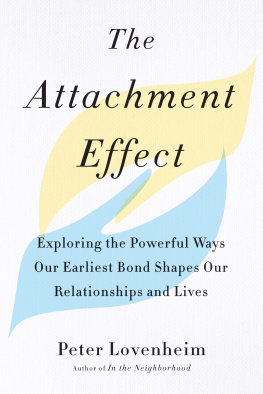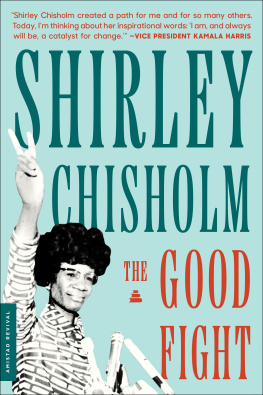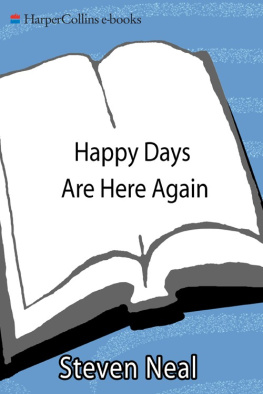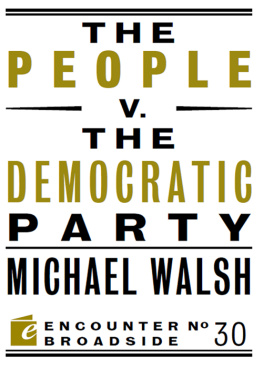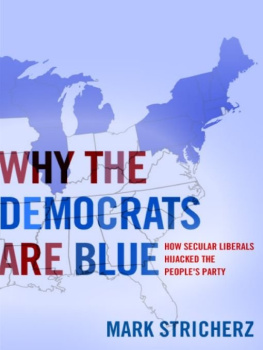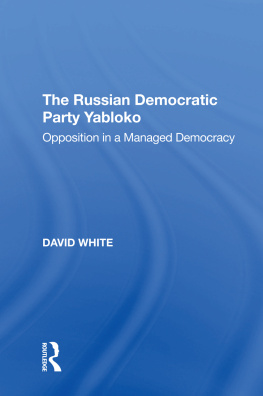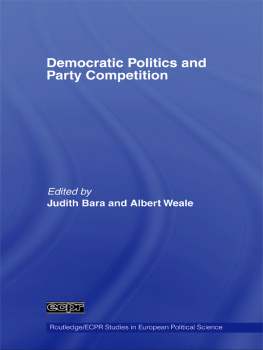If an author were to acknowledge fully the debt he owed to others in the research and writing of his book few pages would be left for the narrative. Each time I set out on this task I am amazed at the many individuals who in some way have contributed to the final product. Space requires that most of them remain nameless with only a brief thank you to them all. Yet I remember only too well how they looked up innumerable references for me, chased down manuscripts, dredged up little-used monographs, and answered my questions. In this regard the library staffs at the Pennsylvania State University, the University of Virginia, the University of Indiana, the University of Wyoming, Yale University, Columbia University Oral History Research Office, New York State Library at Albany, the Franklin Roosevelt Presidential Library at Hyde Park, and the Library of Congress were unfailingly helpful and patient.
For aid beyond all reasonable expectations a personal note of gratitude is directed to Judith A. Schiff of the Sterling Memorial Library at Yale, Peter R. Christoph and Juliet F. Wolohan of the New York State Library, and Joseph W. Marshall and Jerome V. Deyo of the Roosevelt Presidential Library. I am also deeply indebted to the McAdoo, Davis, and La Follette families, especially to Mrs. Charles (Julia Davis) Healy and Francis H. McAdoo, for allowing me access to critically important manuscript materials.
Several other persons deserve to be mentioned because of their unique help in bringing this project to completion. Professor Kent Forster already knows my appreciation for the Penn State History Departments research policy and his implementation of it. To Dean Thomas Magner and Professor Stanley Weintraub go my thanks for making travel and clerical monies available whenever I needed them. I am especially grateful to the Institute for the Arts and Humanistic Studies which elected me to membership while I was engaged in this studya privilege which I took seriously and an honor which I hope to redeem. As usual, my wife, Eve, was always my best and severest critic throughout the long hours spent in writing and revising the manuscript. How she managed to bear up under my repeated requests to listen to this just one more time escapes me.
Finally, to the three named on the dedication page goes a fathers pride in having the best crew around, and a promise of at least a few long and uninterrupted voyages before the next writing project takes precedence.
R.K.M.
Eden West, Tortola, B.V.I.
August, 1975
Robert Keith Murray is Professor of American History at Pennsylvania State University and a scholar in the era of United States history that immediately followed World War I. He was born in Union City, Indiana, and studied at Ohio State University, receiving his Ph.D. in 1949. In addition to publishing articles in numerous periodicals, Dr. Murray is the author of three previous books: Red Scare: A Study in National Hysteria, 19191920 (1955 and, in paper, 1964), The Harding Era: Warren G. Harding and His Administration (1969), and The Politics of Normalcy: Governmental Theory and Practice in the Harding-Coolidge Era (1973). As many authors will admit, he says, the idea for The 103rd Ballot came from the index of the previous book. His research in the Harding era provoked his interest in the state of the Democratic party in the mid-1920s and its infamous 1924 convention.
Professor Murray won the Phi Alpha Theta National Book Award for 1969 and the McKnight Distinguished Book Award for 1970. He is a member of the National Archives Commission and treasurer of the Organization of American Historians.
Professor Murray and his wife live in State College, Pennsylvania. They have three grown children, and the entire family are passionate sailors who sail their sloop in the waters around the Virgin Islands whenever time permits.
Australia
HarperCollins Publishers (Australia) Pty. Ltd.
Level 13, 201 Elizabeth Street
Sydney, NSW 2000, Australia
www.harpercollins.com.au
Canada
HarperCollins Canada
2 Bloor Street East - 20th Floor
Toronto, ON M4W 1A8, Canada
www.harpercollins.ca
New Zealand
HarperCollins Publishers New Zealand
Unit D1, 63 Apollo Drive
Rosedale 0632
Auckland, New Zealand
www.harpercollins.co.nz
United Kingdom
HarperCollins Publishers Ltd.
1 London Bridge Street
London SE1 9GF, UK
www.harpercollins.co.uk
United States
HarperCollins Publishers Inc.
195 Broadway
New York, NY 10007
www.harpercollins.com
THE 103RD BALLOT
THE POLITICS OF NORMALCY
THE HARDING ERA
RED SCARE
It was a landslide, it was an earthquake, moaned Joseph P. Tumulty, President Wilsons private secretary. Franklin Roosevelt, the defeated Democratic candidate for Vice-President, wrote at the head of a letter to a friend: Franklin D. Roosevelt, Ex V.P., Canned. (Erroneously reported dead). Ohios Governor James M. Cox, the primary victim of the avalanche, was too stunned to comment at all.
It was a fantastic victory. Although all indices had pointed to a Republican success in 1920, no one had dared predict such a staggering Democratic defeat. The vote as recorded by the New York Times was 16,181,289 for Warren G. Harding; 9,141,750 for Cox; and 941,827 for Eugene V. Debs (Socialist). Harding carried thirty-seven of the forty-eight states and received 404 electoral votes. His popular majority (60.3 percent) was the largest yet amassed in the nations history. Because of the election, the Republican party now controlled the House 303 to 131, the widest margin in the partys annals. In the Senate the Republicans not only retained all their seats but captured ten from the Democrats, giving them a margin of twenty-four. Thus, the decade of the 1920s began with the Democratic party in full retreat and the Republicans preparing to establish their return to normalcy.
The precise reasons for this change in the American political climate have been the subject of much debate. Some have said that support for American participation in the League of Nations marked the downfall of the Democrats. Some have claimed that the Democratic defeat was merely a product of the times and represented a reaction against the idealism of World War I. Others have laid the blame on a whole series of popular frustrations growing out of postwar socio-economic conditions collectively and derisively labeled Wilsonism. Still others have contended that it was because of the personal magnetism of Harding along with the positive appeal of his normalcy proposals. Whatever the reasons, the overwhelming Republican victory in 1920 indicated that political alliances were in flux and that a sizable portion of the voting population was unfettered by party tradition. Significantly, on the very day that New York City gave Warren Harding a 400,000-vote plurality, it endowed incumbent Democratic Governor Alfred E. Smith with a margin of over 325,000.
Long before 1920 there had been a gradual loosening of political loyalties in both parties. For the Democrats this was accompanied by a creeping organizational paralysis. Beginning in 1916 a noticeable conservative trend had set in among Democratic congressional leaders as a crumbling of the old progressive New Freedom coalition became apparent. This development was accentuated by World War I. Some Democratic leaders, especially from the South and certain nonprogressive areas of the North, expressed increasing distress over President Wilsons handling of the war, particularly his expansion of executive power. With the advent of the Armistice, many of these Democrats joined with Republicans to speed up the dismantling of wartime boards and agencies, rivaling their Republican counterparts in calling for a quick return to prewar conditions. The ill-fated congressional campaign of 1918 and the ensuing struggle over the League of Nations added to the Democratic partys troubles and further sapped Democratic strength.
Next page
